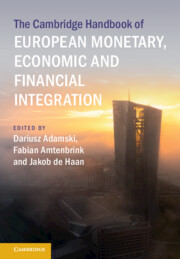Book contents
- The Cambridge Handbook of European Monetary, Economic and Financial Integration
- The Cambridge Handbook of European Monetary, Economic and Financial Integration
- Copyright page
- Contents
- Contributors
- Introduction
- Part I The Economic and Monetary Union
- Part II The Monetary Dimension
- Part III The Economic and Fiscal Dimensions
- 15 Reviving the Case for Policy Coordination in EMU
- 16 Ten Years of the European Semester
- 17 The EU Fiscal Rules
- 18 National Fiscal Policy in EMU
- 19 The Politics of Fiscal Integration in Eurozone Reforms and Next Generation EU
- 20 Adjustments in Economic Crises
- 21 Designing a Permanent EU-Wide Stabilization Facility
- 22 Enhancing Private and Public Risk Sharing
- Part IV Financial Integration
- Index
- References
19 - The Politics of Fiscal Integration in Eurozone Reforms and Next Generation EU
from Part III - The Economic and Fiscal Dimensions
Published online by Cambridge University Press: 28 September 2023
- The Cambridge Handbook of European Monetary, Economic and Financial Integration
- The Cambridge Handbook of European Monetary, Economic and Financial Integration
- Copyright page
- Contents
- Contributors
- Introduction
- Part I The Economic and Monetary Union
- Part II The Monetary Dimension
- Part III The Economic and Fiscal Dimensions
- 15 Reviving the Case for Policy Coordination in EMU
- 16 Ten Years of the European Semester
- 17 The EU Fiscal Rules
- 18 National Fiscal Policy in EMU
- 19 The Politics of Fiscal Integration in Eurozone Reforms and Next Generation EU
- 20 Adjustments in Economic Crises
- 21 Designing a Permanent EU-Wide Stabilization Facility
- 22 Enhancing Private and Public Risk Sharing
- Part IV Financial Integration
- Index
- References
Summary
Since the introduction of the Economic and Monetary Union at the Maastricht summit in 1991, the framework of fiscal integration is a controversial topic. More recently, the eurozone and COVID-19 crises triggered reforms, which were accompanied by strong political conflicts. Drawing on political science research, this chapter analyses these recent reforms with a focus on the political conflicts among the Member States of the European Union. The findings show that, in the politics of fiscal integration, the lines of conflict among Member States are rather stable, while the success of reform proposals depends on the German–French integration partnership and the influence of the Commission. The more in-depth comparison between the fiscal reforms to the COVID-19 and eurozone crises points to both continuity and incremental change. A major shift is that the more recent fiscal programme in reaction to the COVID-19 crisis includes joint borrowing on a large scale. On a more general level, a defining feature of fiscal integration is the varying extents to which Member States are fiscally integrated within the eurozone and the EU. The final section of the chapter discusses the literature on differentiated integration related to fiscal integration by emphasizing the challenges for democratic legitimacy.
- Type
- Chapter
- Information
- Publisher: Cambridge University PressPrint publication year: 2023
References
- 1
- Cited by

